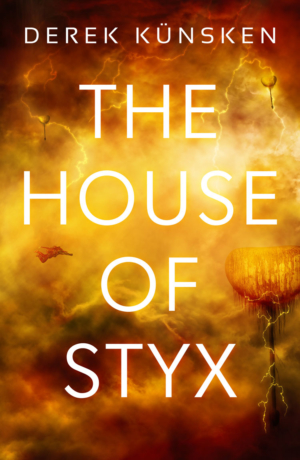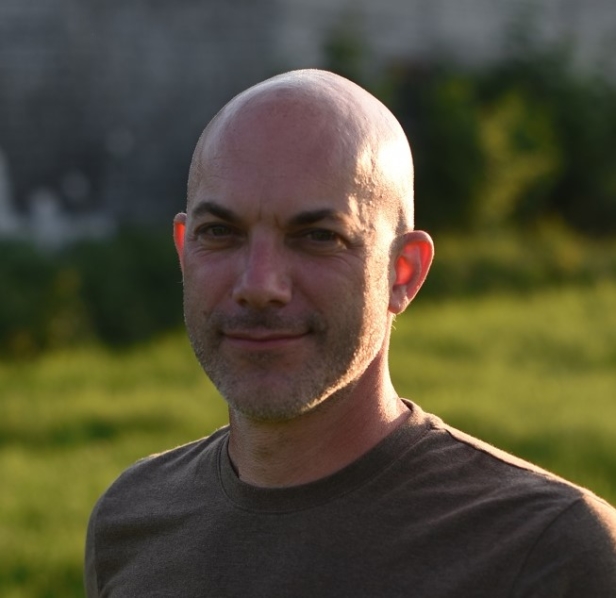Out this month in eBook, The House Of Styx is the first in a ground breaking, action-packed and exciting new science fiction series from Derek Künsken, the best-selling author of The Quantum Magician.
Set in the swirling clouds of Venus, The House Of Styx follows the families of la colonie who live on floating plant-like trawlers, salvaging what they can in the fierce acid rain and crackling storms. Outside is dangerous, but humankind’s hold on the planet is fragile and they spend most of their days simply surviving.
But Venus carries its own secrets, too. In the depths, there is a wind that shouldn’t exist and the House of Styx wants to harness it…
We sat down with Derek Künsken to discuss Venus, family, the French language and jet packs…
Venus is a very real character in this book, with everyone fighting their own personal battle with the planet – where did the idea come from to personify the planet?
It’s human nature to project meaning onto the world. It’s a way we impose order on where we live. Even our language very easily slips intent into the inanimate. We tell students that water flows downhill because it ‘wants’ to be in a more stable state. We say DNA ‘wants’ to make more DNA. Those verbal shortcuts make communication simpler but also colour the way we think about the world.
The novel shows a society that never touches the ground, whose inhabitants are blown by the winds from birth to death, who can’t trust the equipment to keep them safe. I think the folk tales and the stories told to children necessarily use personification of the world and once you grow up with that perspective, it’s hard to let go.
My favourite point of view is the tight third person, where the narration is really close to the point of view character’s stream of consciousness. It’s a wonderful place to write from because the superstitions, false assumptions, the dominant imagery and the personal metaphors all surface naturally.
I suppose the other reason Venus as a setting also became Venus the character is because I see so much beauty in her wildness, her ironic sterility, in her savage violence and in her occasionally becalmed winds.
The House Of Styx makes reference to other colonisations across the solar system, what made Venus the most appealing for this particular story?
I loved Kim Stanley Robinson’s Red Mars and really enjoy stories set in the moons of the gas giants, but in some ways, those feel like paths well-trodden in science fiction. The universe of The House of Styx certainly has colonists and polities in those other places, but I wasn’t interested in those worlds and niches right now. The fact that we don’t have a lot of science fiction set on Venus made it attractive for me. As well, the acidic, chaotic, violent environment supported the kinds of metaphors I wanted to work with in ways that Mercury or Europa might not.
You have created a complex society complete with class structures and capitalist greed. How did you go about building that world?
I deliberately chose the Québécois to make the society of colonial Venus, not only because I’m descended from nine generations of French Canadians. After the 1750s, Québec became a possession of England, and until the 1960s, English banks, English politicians, with some help from the church, exercised a lot of control over a relatively agrarian Québécois society. That ended in the 1960s when the Québécois passionately rejected all three socio-economic forces. Separatism bloomed, with a strong and logical need to protect the French language from being assimilated by a sea of North American English society. Thematically and personally, I wanted to recapitulate in The House of Styx the forces that shaped modern Québec. Knowing that allowed me to start with a very good sense of what strengths and insecurities Venusian society would begin and end with.
This is a very family-oriented story. The themes and plot are such that it could almost be transplanted to be set anywhere and at any time. What made you turn to use science fiction as a vehicle for your story?
I’m pretty sure science fiction is my first love. My imagination has always lived in outer space and on other worlds, so it’s probably my conceptual linga franca. I think science fiction and fantasy offer the broadest possible canvasses upon which to paint a story. There is no narrative, character or setting element you can’t make into exactly what you need to make the story stronger, more compelling. The other thing is that the setting itself set some parameters around the story that acted as writing prompts. For example, the intense pressure and heat on the surface obliged me to put a bathyscaphe in there. And the acid of the clouds prompted me to think of all the ways people in a society would respond emotionally to the environment – from there grew Thérèse’ cult.
Many characters originate from Quebec and have not lost their French heritage with their names and language. How important was this to you?
Super important. Half my roots are Québécois. For very important metaphorical reasons, I put the Québécois into the clouds of Venus in the original 2014 Analog Magazine novelette ‘Persephone Descending’ that first featured this world. The setting and the people clicked for me. It was also great that I hadn’t read a lot of scifi with Québécois characters in it, so I felt that I was walking on less-trodden ground creatively.
The fact that one of your characters has Down’s Syndrome plays an important part in the story. You tackle the realities of having a family member with Down’s head-on without sugar-coating some of the hero’s inner thoughts. Were you nervous about approaching this?
I started with the idea that families are not made up of angels. People can have strong and opposing views, sometimes even residing in the same person. The circumstances of Jean-Eudes’ birth are kind of the inflection point for the fate of the D’Aquillon family and consequently, for Venusian history. If George-Étienne and Jeanne-Manse had agreed to abort their Down’s Syndrome child as the government had demanded, I think the colony would have shrivelled and vanished within a half dozen decades.

All of your characters are also battling within themselves to find who they are, whether they’re struggling with substance abuse or even born in a body of a different gender. You address each of these sensitively and with understanding. How challenging was it to try and portray the complex thoughts and emotions?
Thank you for your kind words! Like every writer, I was hoping that it would all work. One of my favourite statements about literature is that reading it makes us understand that other people are human beings too; literature is a lens through which we can see the souls of strangers. Like any writer, I obviously did a lot of research into each of the elements of the characters in the story. I think one of the things that helped me was to understand that people make mistakes and maybe they learn and maybe they don’t. I’m a very rational and introspective person so when I find mistakes I’ve made, I think about how to make myself a better person, and that’s the way I’ve written a lot of very rational characters until now. But exploring the mistakes of Émile and Marthe and George-Étienne and Thérèse and others without necessarily having them on that same self-examination track made them surprising and more real to me in the final edit.
Although the characters are trapped by Venus and the life they have there, this is not a claustrophobic book. It’s full of characters flying with wing packs among the clouds. Where did the idea of moving by wing pack come from?
I think the idea of wing packs came mostly from the need for air travel. If a society lives entirely in the atmosphere, there will be natural and logical vehicles like dirigibles, airplanes, drones and so on. But on a more fun side, I grew up on Saturday morning cartoons and live-action shows that had jet packs, and some of my favourite comics as a kid were Marvel’s Micronauts series, where wing packs featured prominently. There’s something fun and pulpy and wish-fulfilly in a machine you strap to your back that lets you fly. You can feel the love and excitement the characters who love to fly.
What are you reading right now?
I’m reading more science lately, both books and articles, and listening to podcasts. Mostly, I’m enjoying comic books. I decided last November to just start re-reading the X-Men from the beginning in 1963. This week I reached 1976 and I’m blogging about it every two weeks at www.blackgate.com.
What are you working on next?
I’m writing the third Quantum Evolution novel (the series which began with The Quantum Magician) right now. After that I’m under contract with Solaris Books to write The House of Saints, which will conclude the story begun in The House of Styx. I haven’t been doing much short fiction lately, in part because novel-writing is keeping me busy right now. I’ll eventually want to go back to it. I’m enjoying life and in the summer I think I naturally read a bit less because I go camping with my son.
